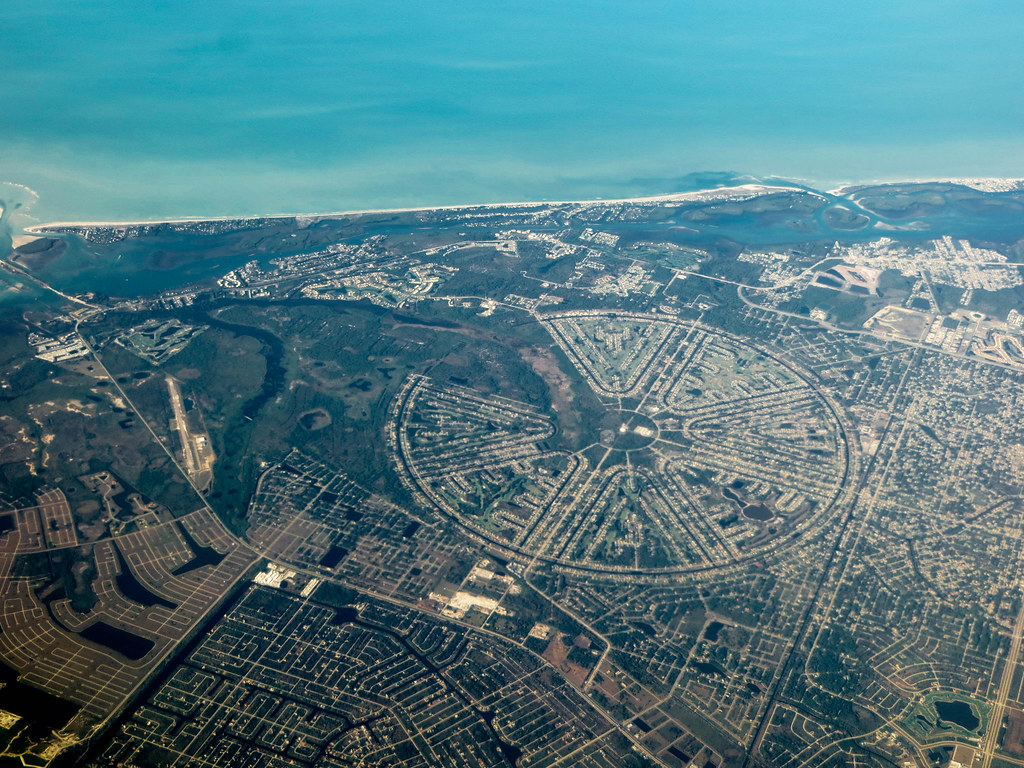Rotonda West looked like a two-dimensional rendering of the Death Star transformed into a planned community along Florida’s southern Gulf Coast (map).

It also had an air of familiarity, like I’d seen it somewhere before although I stumbled across it quite by accident just recently. My recollection gets a little hazy now that I’ve posted more than 1,200 of these Twelve Mile Circle articles. It’s never gotten so bad that I’ve written the same article twice although I came close a couple of times. I’ve made it a habit to always double-check.
Indeed, Rotonda West made a guest appearance once before although not in an article. Reader “Joshua” included it in a comment on Corona’s Corona all the way back in 2009. He described it then as, “about 7/8th of a circle. It’s almost like missing one category pie piece in Trivial Pursuit.“
I must have tucked Rotonda West somewhere within the deep crevices of my mind although I never pursued it farther. Maybe its “rediscovery” offered an opportunity for me to undertake a proper examination of the situation. Clearly someone needed to check the facts further.
Some History
The Rotonda West Association maintained a comprehensive website with more details that I’ve seen for some actual cities much larger, devoting an entire section and multiple articles to its history. Salient details flowed freely from that definitive source.
“The land on which Rotonda sits was owned originally by brothers William and Alfred Vanderbilt. William was a former Governor of Rhode Island, and both brothers were direct descendants of the renowned Cornelius Vanderbilt…. The brothers acquired the Rotonda land (36,000 acres) in 1952… Eventually, Alfred owned most of it and sold it to Cavanagh Leasing Corporation of Miami in 1969 for $19.5 million, when ranching became uneconomical.”

Like much of South Florida, the community of Rotonda West didn’t have particularly deep roots. Nonetheless it began to grow rapidly especially with those of a certain senior age who had plenty of time for leisure activities. That’s probably why Trip Advisor listed golf courses as two of the Top 5 things to do there.
It also had an odd connection to Ed McMahon, the longtime sidekick to Johnny Carson of the Tonight Show. The owners of Rotonda West hired McMahon to promote the community pretty much everywhere he went using any means available to him. They paid him off with property and a house in Rotonda West. He also became a vice president of the development corporation. The arrangement must have worked because now almost nine thousand people live there.
No Other Rotondas
Assuming the existence of a Rotonda West, it seemed natural that there should be another Rotonda community elsewhere acting as its namesake. There wasn’t. The community offered an explanation for that too.
“Yes, there was a Rotonda East. It straddled Florida’s Palm Beach and Martin Counties. In the 1960s, Cavanagh reportedly sold about 18,000 acres of mostly swampy land there for up to $6,000 an acre. But suddenly the new ecology awareness took hold, bringing tougher country building and zoning codes… Rotonda East died stillborn.”
I loved that crack about the “new ecology awareness” killing Rotonda East before it could be born. Another article offered similar views about Rotonda West,
“The environment was another problem for developers.’Ecology’ became a new buzz word, as did ‘wetlands.’ The newly-found interests of eagles, scrub jays, gopher tortoises, sea turtles and certain snakes now had to be addressed. This retarded construction in Rotonda West.”
I’m sure this was a fine community and I didn’t intend to cast aspersions, I just found it odd to see such a nakedly pro-development slant: darn ecology and wetlands and animals and such standing in the way of draining swamps and blocking plans for all those lovely houses. Feel free to throw in a “get off my lawn” if you like, too.
So, that was that. It was a fairly typical South Florida story except for the community’s circular shape which was chosen because it was believed to be “softer and more romantic.”
Wait, What’s a Rotonda?

I was certainly aware of Rotunda (with a “u”) — after all I was an alumnus of the University of Virginia with its rather distinctive Rotunda designed by Thomas Jefferson — and I figured Rotonda must have had a similar derivation. Was it an accepted version, however, or was it a clever marketing ploy used by the developers of Rotonda West?
I turned to a dictionary “1. a round building, especially one with a dome. 2. a large and high circular hall or room in a building, especially one surmounted by a dome.” It derived from the Italian rotonda (aha!) which in turn came from the Latin rotundus, meaning round. The usage was entirely proper — perhaps a little pretentious that they went with Italian instead of English — although it was perfectly suitable for a circular community.

Leave a Reply